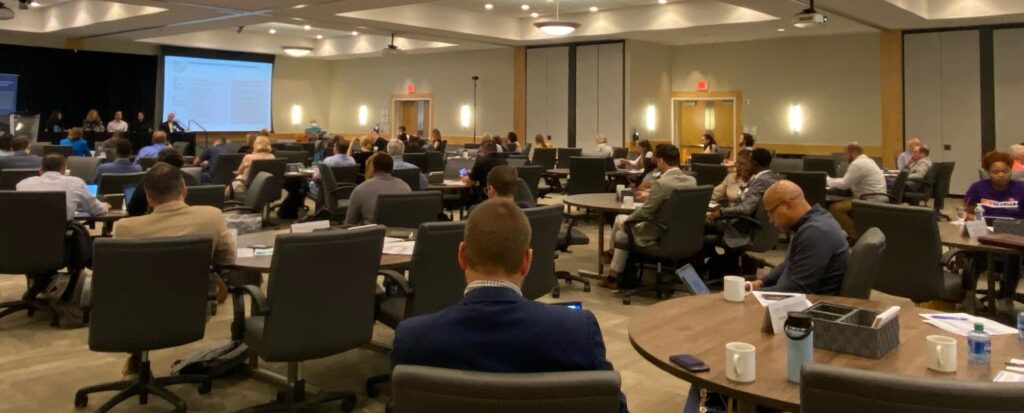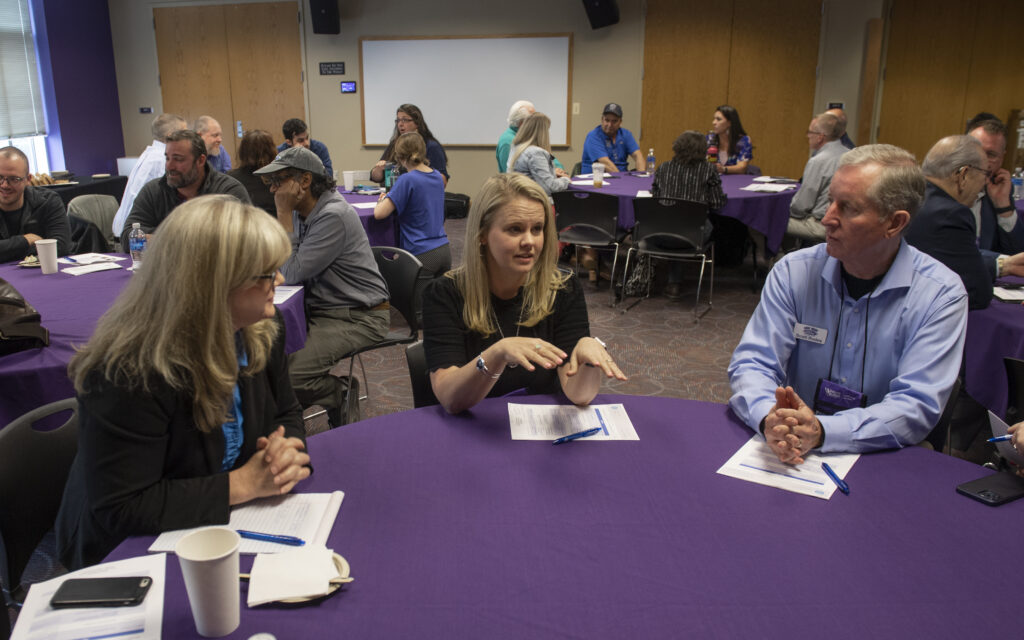Home > Our Work > State EV Policy > North Carolina EV Policy
North Carolina EV Policy
The Electrification Coalition conducts policy work in North Carolina to advance the deployment and adoption of electric vehicles and development of charging infrastructure.
To learn more, download our factsheet: Electric Vehicles in North Carolina (PDF)
North Carolina Policy Landscape
North Carolina has taken important steps toward an electrified transportation future, with actions by the state government, local governments, non-governmental organizations, and the private sector, including utilities and EV-related companies.
Download our 2024 North Carolina EV Policy Landscape (PDF) to learn more about the policies, strategies, and partners that can help North Carolina accelerate electrification. This document reflects input from a wide range of on-the-ground stakeholders and builds upon the insights of previous roadmaps and guidance documents, including those developed by the EC.
In April 2024, Governor Roy Cooper outlined his budget recommendations, including a full repeal of language in last year’s budget prohibiting the Advanced Clean Trucks rule. Read the EC’s statement.
Freedom to buy vehicles in North Carolina
Outdated laws in North Carolina are standing in the way of consumers’ freedom to buy the vehicles of their choice. These restrictions on car and truck buyers are obstructing economic growth and blocking North Carolinians’ access to the latest automotive technologies.
Check out our Freedom to Buy Vehicles in North Carolina page for more information on the subject.
North Carolina Medium- and Heavy-Duty Sign-on letter
In 2021, a group of 28 business leaders signed on to a letter urging Governor Roy Cooper to accelerate the transition to electric medium- and heavy-duty (MHD) vehicles to protect North Carolina’s economy, energy security, public health, and climate.
The letter endorses the following actions:
- Support incentives, utility investments and state targets that will accelerate the electrification of trucks that travel along our highways and through our neighborhoods to deliver goods to our homes and businesses.
- Convene an MHD electrification working group that includes North Carolina’s largest commercial fleets.
- Electrify public transit and school buses to provide clean, healthy ways for North Carolina’s residents to travel to and from school, work, and home.
- Invest in the development of MHD charging infrastructure to ensure that North Carolina does not miss out on the economic opportunities afforded by the electrification of transportation.
Federal Funding in North Carolina
Federal funds from the Bipartisan Infrastructure Law are key piece to ensuring fast and equitable adoption of EVs and distribution of charging infrastructure. Below is a list of awarded federal funding in North Carolina:
National Electric Vehicle Infrastructure (NEVI) Program
North Carolina was awarded $109 million over five years to implement a highway charging corridor program. The funds will be used to install fast, reliable charging every 50 miles along almost 4,000 miles of alternative fuel corridors. All charging sites will be located within a mile of a highway.
The request for proposals for this program will be released soon.

Charging and Fueling Infrastructure (CFI) Discretionary Grant Program
The first round of CFI grant program awardees were announced in January 2024, and North Carolina was awarded two programs:
| Program Name | Program Location | Funds Awarded | Program Type | Description |
| Public Access to EV Charging for the City of Kings Mountain | City of Kings Mountain | $822,737.31 | Community | The City of Kings Mountain will receive $822,000 to build 34 EV charging ports at five public parking areas, less than a mile from Interstate 85 and US Highway 74. Locations of the new charging stations in a rural community close to the NC-SC border, include city hall, a central business district, a public works facility and two parking lots near Exit 5 of I-85. The area is a developing tourist and recreational development that includes the Two Kings Casino owned by the Catawba Indian Nation. |
| Empower Durham: Equitable EV Charging in the City of Durham, NC – Corridor Component | City of Durham | $4,864,000.00 | Corridor | The City of Durham will receive $4.8 million to install fast charging EV ports at up to three locations in historically disadvantaged communities of the city within one mile of Interstate 40, Interstate 85, Interstate 885, and US Highway 70. The new chargers will be built along major national highways designated as Alternative Fuel Corridors and will include community outreach to educate residents about electric vehicles. |
EPA Clean School Bus Program
Two rounds of Clean School Bus program funding have been awarded so far, with North Carolina receiving 145 buses in total:
Funding year | Type | District Name | Number of Buses |
2024 | Grant | Durham Public Schools | 38 |
2024 | Grant | Charlotte-Mecklenburg Schools | 27 |
2024 | Grant | Cherokee Central Schools | 15 |
2022 | Rebate | Columbus County Schools | 9 |
2024 | Grant | Kannapolis City Schools | 8 |
2022 | Rebate | Mina Charter School of Lee County | 7 |
2022 | Rebate | Discovery Charter School | 6 |
2022 | Rebate | Bladen County Schools | 5 |
2022 | Rebate | Halifax County Schools | 4 |
2024 | Grant | Bertie County | 4 |
2024 | Grant | Maureen Joy Charter School | 4 |
2024 | Grant | Emereau Bladen Charter School | 3 |
2024 | Grant | KIPP Durham College Prep | 3 |
2024 | Grant | Cumberland County Schools | 2 |
2024 | Grant | Granville County Schools | 2 |
2024 | Grant | KIPP Halifax College Prep | 2 |
2024 | Grant | Madison County Public Schools | 2 |
2024 | Grant | Richmond County Schools | 2 |
2024 | Grant | Johnston County Schools | 1 |
2024 | Grant | Reaching All Minds Academy | 1 |
Events in North Carolina
Southeastern Regional Rural RoundtablE

On October 4, 2023, the Electrification Coalition convened policymakers and industry representatives from across the Southeast in Charlotte, NC, to discuss issues affecting rural transportation electrification in Florida, Georgia, and the Carolinas. Areas of focus included workforce development, the role of utilities in the transition, battery recycling, and more. Click here to view speakers and relevant resources on the event page.
North Carolina Rural Roundtable

On May 5, 2023, the Electrification Coalition and local and state leaders met for a roundtable discussion on vehicle electrification in rural North Carolina. The purpose of the event was to offer insights into the best practices, funding opportunities, and community needs to ensure the greatest influence on electric transportation. This includes buses, fleet vehicles, and charging infrastructure in rural North Carolina. There was a particular emphasis on workforce development and job opportunities that can be created by electrification infrastructure expansion plans.
North Carolina EV Policy Bootcamp
We brought together policymakers, industry experts, and advocates for a day-long bootcamp in September 2020 to accelerate EV adoption in North Carolina. See a full list of speakers, slides, and a recording of the event.
Additional Resources
According to the fourth annual Transportation Electrification in the Southeast report, published by Atlas Public Policy in collaboration with the Southern Alliance for Clean Energy, North Carolina topped 70,000 electric vehicle registrations as of June 2023. Read more transportation electrification milestones from states across the Southeast in the report.
Great Smoky Mountains National Park has published a guide titled Electric Vehicle Charging in Great Smoky Mountains National Park and Beyond that takes readers through the different charging options in and around the park!
